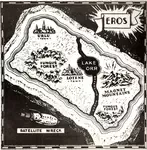Re: Stretching the OSS
by John Michael Greer
(Cumberland, MD, USA)
That's an interesting question. I think a good case can be made for membership in the OSS when a story takes place entirely in our solar system but the broader context involves some degree of reference to interstellar travel. (Lovecraft is an example of this, to return to my usual hobby horse -- a lot of his critters, from the Great Old Ones through the Great Race of Yith to the ancient beings in "At the Mountains of Madness" -- all came from the stars originally.)
With this in mind, I wonder whether you'd consider three of Cordwainer Smith's SF stories for inclusion in the OSS listings. Most of his writings, of course, were set in a classic CRIM setting, with interstellar travel in planoforming ships a routine if not risk-free activity, but his stories "Mark Elf" and "The Queen of the Afternoon" are set on a future Earth of distinctly OSS flavor, and "When the People Fell" is a story about the Chinese colonization of a very OSS Venus.
{comment from Zendexor: Yes, I clean forgot "When the People Fell" - I was thinking about Cordwainer Smith recently, and about how he never set any stories on our neighbouring worlds - yet he did, and that's the one; what's more, it's a good story. I seem to remember, also, that one of his characters in another tale - it may have been Rod McBan - paid a brief visit to Mars.
But of course the main case for discussion of Smith here stems from his tremendous visions of a future Earth.}





























